- Home
- Keith R. A. DeCandido
The Zoo Job Page 7
The Zoo Job Read online
Page 7
The point was, it was ridiculously easy for Parker to avoid being seen while she spied on people. Parker hated easy. There wasn’t any kind of challenge to it.
Plus it just seemed so pointless. Hardison himself had said it best two days ago: “Nate, I can track their digital footprint all over everywhere without havin’ to get up from”—he had put on a British accent—“the comfy chair!” Back to his normal voice: “Why we gotta go all over creation, when—”
“Because we need to know who these people are,” Nate had interrupted, “not just what they do when they’re sitting at their computer and where they take their cell phones.”
There were six people on the Brillinger Zoo board of directors. Nate assigned two each to Parker and Hardison, and took the other two for himself.
The first one on Parker’s list was Steven Fischer. He lived in a house in Wilbraham. According to Hardison, he was a widower, and according to Parker, after following him around for a day, he was the single most boring human being who ever lived. And Parker knew even more boring people than she knew smart people. There was her good friend Peggy, who was very sweet, but very very dull. Of course, her boringness was what made her of interest to Parker. She liked the idea of having friends, even if that friend talked way too much about cats and catering. Then there was Archie’s daughter, whom Parker had never formally met, but on whom she spied a few times after she and Archie reunited for that Wakefield Agriculture job. She was stupendously boring. Then there were all those other gendarmes in Nice, who were not only boring, but stupid. Parker was able to run rings around them, which made it easier to get away from the smart one.
And, of course, Steven Fischer, who had them all beat for boring.
“Parker, how’s it going?”
Never was Parker more grateful to hear Nate’s voice in her head.
“Yesterday, Steven Fischer got up at eight o’clock, read the news on his laptop while eating a piece of dry toast and drinking pineapple juice, walked on his exercise thingie for fifteen minutes, watched some stupid morning talk show, called his daughter and talked for half an hour, called his granddaughter and talked for half an hour, ate lunch, which consisted of a protein shake and another glass of pineapple juice, called his broker, walked to the church that’s a mile away, played bingo for three hours, walked back home, microwaved a frozen dinner and ate it while watching television, then went to bed at eleven.”
“Parker—”
“Today, you know what he did? The exact same thing!”
Hardison came on the earbud. “Nate, I’ve checked this guy’s digital footprint, and it’s a rut. He really does do the same thing every day. Only time he’s ever varied the routine is Saturday nights, ’cause his church don’t do bingo then, and whenever there’s a board meeting for the zoo, when he drives to Brillinger. It’s a dead end.”
“He drives in a 1985 Buick LeSabre.” Parker added this for no reason except that she’d broken into the garage at one point last night because she was bored. It had to be contagious. And there was, perhaps, no greater comment on Fischer’s boringness than the fact that the most interesting thing about him was that he drove an old workhorse of a car.
“All right, fine,” Nate said. “It’s been two days, that’s enough. Move on to MacAvoy.”
“Yay!” Parker swung down off the tree branch she was sitting on and landed in Fischer’s front yard.
“Parker,” Nate said slowly, “were you just in a tree?”
“Fischer has a very nice oak in his front yard. I could see everything, it was great!” It was true. The branch she’d been on was right between the two floors of the two-story house. Hardison had said that Fischer and his late wife had raised their kids in that house, but it was really too big for him by himself. He only used the kitchen, living room, and one bedroom—and she could see all three from that branch.
Her jumping down and crying “Yay!” was the first actual noise she’d made since she started spying on Fischer, and since it was midevening, he was currently in the living room watching some television show or other about detectives or lawyers or something, his plastic frozen-dinner container abandoned next to him on the couch. Now he ran to the window and stared right at Parker.
Shaking his fist, he cried, “Get off my lawn!”
Grinning widely, Parker did as he requested. She ran toward the car Hardison had rented for her under her Alice White identity. The vehicle was parked around the corner.
“Did he just say what I think he just said?” Hardison asked.
“Want me to go back and ask?”
Nate and Hardison both said, “No!” in perfect unison.
When she got to the car—a beige 2004 Toyota Corolla, which was as boring a car as Fischer was a person—she noticed a white piece of paper and an orange envelope stuck under the windshield. “Hardison, I got a parking ticket.”
“Didn’t I tell you to look at the signs to make sure it was legal?”
Parker hesitated. “You—probably did, yeah.” She took the ticket and envelope off the windshield and tossed them to the ground. “You’ll take care of it, right?”
“You’re just lucky they didn’t tow your ass—and yeah, I’ll take care of it. Y’know, the signs are right there on the street, in English and everything.”
As she pulled into traffic and blazed down the suburban road at fifty miles an hour, she realized that sometimes Hardison could be just as boring as Fischer.
SIX
Sophie followed Eliot into the clinic and was immediately struck by how open it looked. The impression was entirely illusory, as the building had many narrow corridors that led into tiny rooms, but there were no doors. Looking more closely, she saw that some of the doorways had broken and bent hinges—but the rest were in perfect shape. Sophie suspected that some of the doors had been removed forcibly, and the Reverend Maimona had just decided to take the rest off.
Ceiling fans wobbled above, mostly serving to draw people’s attention to their own perspiration, but not doing much to provide relief, at least on the face of it. Given how close to the bone the running of such a place as this had to be, that they were willing to spend the money to keep the fans going revealed just how necessary they were.
As she dabbed some of the perspiration off her own forehead, Sophie seriously considered donating enough money to buy air-conditioning units for the building.
The walls of the clinic were the light beige that white walls inevitably turned after years of never being cleaned. Sophie saw several children chasing each other through the hallways, an older woman fruitlessly pursuing them, urging them in Portuguese to slow down.
As the older woman passed by Sophie and Eliot, she looked at them with fear and suspicion. The woman herself was in a threadbare housedress that looked like she had first worn it twenty-five years and fifteen pounds ago. Even so, she was far better dressed than the children she chased, who wore only shorts that had once been slacks, the legs of which had been sloppily cut off.
The path to the Reverend Maimona’s office included passing by the many file cabinets Eliot had mentioned on his way out yesterday. They lined an entire wall of the corridor for about fifty meters. Each drawer’s contents were indicated by words in Portuguese on labels that were still white, unlike the walls, so they’d been applied recently. It looked as if the Portuguese words were typed on a manual typewriter. At three equidistant points atop the cabinets were wire-frame baskets, piled haphazardly with overstuffed file folders. Each basket was labeled with the word REPUDIAR—these were files that needed to be put back away and hadn’t been yet.
A woman stood at the doorway to the reverend’s office, radiating hostility. She was leaning against a wooden desk that was piled with papers and what Sophie assumed to be the very manual typewriter that had made all the labels on the file cabinets and baskets. She suspected that, if Hardison w
ere here, he’d have burst a blood vessel by now.
The hostile woman simply had to be Amalia, the reverend’s assistant. She had all the suspicion—but none of the fear—that the old woman had shown earlier. The dress she wore was a polyester knockoff of a designer dress, which must have been agony to wear in this heat.
“Welcome back, Agent Smith.” Amalia spoke in as unwelcoming a tone as was possible. She straightened up from leaning on the desk, causing the desk to shift on uneven legs.
“I told you, ma’am,” Eliot said, “I’m not an agent of anything.”
“Of course.” Amalia turned to Sophie and offered a hand. The smile was still insincere, but she put more effort in disguising the fact for Sophie. “You must be Dr. Onslow. I’m Amalia Sanger.”
Adding an Afrikaans accent to her usual speech pattern, Sophie said, “My pleasure, Ms. Sanger.” She switched the small briefcase from under her right arm to under her left so she could return the handshake. “What is it you do here?”
Before Amalia could answer, a voice spoke from inside the office. “She is the Lord High Everything Else.”
A figure matching that of the pictures Hardison had shown the team of the Reverend Maimona came out from the office, bearing a small smile.
Sophie turned slightly. “Ah, The Mikado. I saw a magnificent performance of it in London during a vacation there.” This was actually true, except for the vacation part. Sophie almost hadn’t attended the performance after she was rejected for the role of Katisha—rejected even as the understudy, or a place in the chorus, or indeed any position that placed her anywhere near the theater prior to opening.
“You are quite lucky,” Maimona said, his smile widening.
Amalia threw up her hands. “Does everyone know this play but me?”
“In any case,” the reverend said, “unlike Pooh-Bah, Amalia has worked for her title. She does whatever is necessary to keep us open, yes? As do we all—few of us in this clinic have single tasks.”
Maimona wore a brown linen shirt and matching linen pants. The top two buttons of his shirt were unbuttoned, revealing a gold necklace with a cross dangling at the end of it. His clothes were well worn and sweat-stained, but looked like they had been pressed prior to his putting them on. Idly, Sophie wondered if the reverend had done the ironing himself or if that was part of what Amalia did to keep the clinic open. She was obviously the one most concerned with keeping up appearances.
“You must be the Reverend Maimona,” Sophie said, offering her hand.
“The cross around my neck always gives it away.”
Unlike Amalia, whose hands were callused only at the fingertips—no doubt from using the manual typewriter—Maimona’s hands were completely callused. This was a man who’d done plenty of hard work.
Three of the fingers of the hand he shook with also felt uneven. They’d obviously been broken, possibly more than once—or just once and reset badly. There was also a tightness in his handshake that indicated a stiff shoulder. Possibly he’d been shot there—Sophie had once had a similar hitch in her own handshake after Nate shot her in the right shoulder in Paris about a decade or so earlier. (In his defense, she’d shot him first when he broke in on her stealing several paintings.) It had taken her years of exercises to get rid of that tell. Maimona had less reason to work to hide the fact that he’d been shot.
“Please come in, Dr. Onslow,” the reverend said, indicating his office with one hand. He then cut between Sophie and Eliot. “Thank you, Mr. Smith, that will be all.”
Eliot got that smoldering look he got in his eyes when somebody pissed him off. While still keeping his face pointing at the reverend, he flicked his eyes briefly at Sophie.
She nodded almost imperceptibly. Eliot then nodded at Maimona somewhat more perceptibly. “I’ll be outside if you need me, Dr. Onslow.”
“I should be fine, Mr. Smith,” Sophie said in an only partially reassuring tone.
Eliot left, followed quickly by Amalia. As Sophie moved into the reverend’s office, she heard footsteps approach and a voice speak in Portuguese: “Amalia, I cannot find the Assis file.”
“Did you check under A?” Sophie heard a mischievous tone in Amalia’s voice that hadn’t been there when she was dealing with Eliot.
Tightly, the man said, “Yes, of course I did.”
“It’s probably in one of the baskets.”
“Those huge baskets atop the file cabinets? When were they last refiled, when Lionel was king?”
The two voices faded as they moved away from the office, no doubt to search for the errant file. Sophie took a seat in the guest chair that faced the desk, placing the briefcase in her lap.
As Maimona walked around to his side of the desk, she noted the piles of papers, maps, pamphlets, flyers, and more, all weighed down with rocks, as well as the ancient computer that took up half the desk.
Sophie removed from the briefcase a manila folder that was filled with eight-and-a-half-by-eleven sheets of paper—printouts of everything Hardison had put on the jump drive—and handed it across the desk.
“Here is my full dossier, Reverend. I hope you appreciate how much this cost. The Internet café in Malani City charged three marks per page!” The Malani mark was the equivalent of a pound in the UK, or one and a half U.S. dollars. Sophie could afford the money, of course, but it was still a fairly outrageous price to have to pay.
Maimona flipped through the pages. “I’m sure Mr. Smith’s employers can spare the cash.”
“Actually, he made me pay for it myself.” Sophie added a touch of bitterness to her tone.
“Somehow, that does not surprise me.” He looked up from the papers. “You seem to be quite qualified, Dr. Onslow. So tell me—why are you here?”
“I’ve been with Médecins Sans Frontières for—goodness, almost six years now. Seems like only yesterday I joined.”
“Time does fly,” the reverend said with a sad head shake. “It seems also like only yesterday that I started this clinic. But it was, in fact, eight years ago.”
“Right after the coup?”
The reverend nodded. “The fighting was—was awful. There were many refugees, and many more sick and wounded. This building had been a school under King Lionel, and President Madeira was going to have it changed to a community center. When General Polonia started his revolution, he made it into a barracks, then abandoned it when he took power.” Maimona shook his head. “The land was originally owned by the Portuguese government, and when they pulled out in 1975, it was given to the Church, which opened the original school. After Polonia . . .” He shrugged. “Nobody ever made a formal claim on it after that.”
“So, strictly speaking, it’s yours?”
“After a fashion.” He smiled. “But we’re here to speak of you.”
“What do you wish to know?”
“Why here? Why now?”
“Until I joined the organization, I lived in South Africa my entire life.” Sophie folded her hands primly in her lap. “I’m quite familiar with the turbulence of this region, especially once King Lionel was overthrown. It was places like this clinic that inspired me. When I learned that you were doing inoculations, I thought it would be a fine opportunity.”
“That is very—very noble of you, Dr. Onslow.”
“Thank you.”
“And also quite absurd.” Maimona steepled his fingers. “Let us be honest, yes? That is why I did not invite Mr. Smith to this meeting. You’re here because the Americans wish you to be here for whatever reason.”
Internally, Sophie smiled in triumph. It was always a trick to play a character well enough to be almost convincing, but not quite. It would have been child’s play for her to sell the reverend on her devotion to providing medicine for the people of Malani, but much harder to find that slightly off note of someone reciting a platitud
e to try to sound authentic without really meaning it.
And it worked, since he saw right through the platitude.
“I’m here to help you with the inoculations, Reverend. That is all that I am able to say.”
Reverend Maimona snorted and shook his head. “Ah, yes, plausible deniability. They should print that on U.S. currency, it is far more apt than e pluribus unum or ‘in God we trust.’”
“I do know that Mr. Smith has very good reasons for wanting me here. Ones that will make the world a better place.”
“Really?” The reverend leaned back in his chair. “Better for whom, precisely? Surely not the people of Malani.”
“I’d say getting rid of terrorists in the area is a very good—” She put a hand to her mouth. “I’m sorry, I shouldn’t have said anything.”
Maimona shook his head and chuckled. “You needn’t apologize. I am not a child, yes? I am aware that the Americans are interested solely in their so-called war on terror—as if a concept can be warred upon. As for getting rid of terrorists, I have lived in western Africa my entire life, Doctor, and I can assure you that the greatest terrorist I have ever seen is sitting in the palace right now. Is he your target?”
Sophie nervously shook her head in order to convey regret that she’d accidentally made a slip of the tongue. “I’m sorry, I’ve said more than I should, already.”
The reverend simply nodded.
After a brief pause, she leaned forward. “Reverend, I’m here to work. Regardless of what you think of me or Mr. Smith, I’m here. I’m willing to do any task, no matter how menial.”
The setup was perfect for the reverend to ask his new doctor to refile the material in the wire-frame baskets, thus providing Sophie with an excellent opportunity to go through the clinic’s files. He had already said that everyone did a little of everything to keep the place going, so this was a man who would think nothing of giving an M.D. so mundane a task, and the need for the filing to be done had just been reinforced by the conversation outside.

 Alien
Alien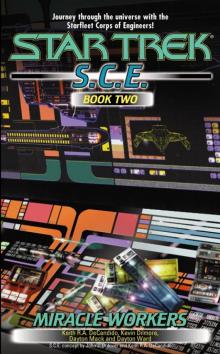 Miracle Workers
Miracle Workers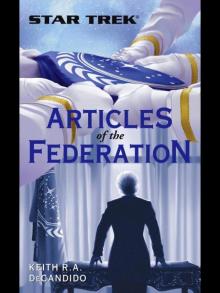 Articles of the Federation
Articles of the Federation Supernatural Heart of the Dragon
Supernatural Heart of the Dragon War Stories: Book Two
War Stories: Book Two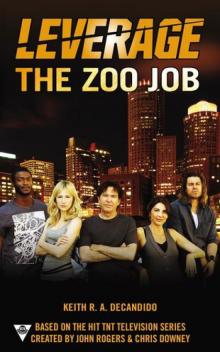 The Zoo Job
The Zoo Job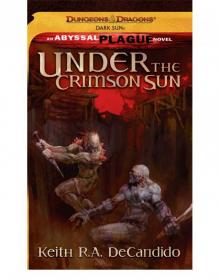 Under the Crimson Sun
Under the Crimson Sun Breakdowns
Breakdowns Mermaid Precinct (ARC)
Mermaid Precinct (ARC) Supernatural 1 - Nevermore
Supernatural 1 - Nevermore STAR TREK - The Brave and the Bold Book One
STAR TREK - The Brave and the Bold Book One Four Walls
Four Walls The Klingon Art of War
The Klingon Art of War Blackout
Blackout War Stories: Book One
War Stories: Book One The Brave and the Bold Book Two
The Brave and the Bold Book Two Honor Bound
Honor Bound Sleepy Hollow: Children of the Revolution
Sleepy Hollow: Children of the Revolution Worlds of Star Trek Deep Space Nine® Volume Three
Worlds of Star Trek Deep Space Nine® Volume Three Star Trek: TNG: Enterprises of Great Pitch and Moment
Star Trek: TNG: Enterprises of Great Pitch and Moment Genesis
Genesis Demons of Air and Darkness
Demons of Air and Darkness Star Trek - TNG - 61 - Diplomatic Implausibility
Star Trek - TNG - 61 - Diplomatic Implausibility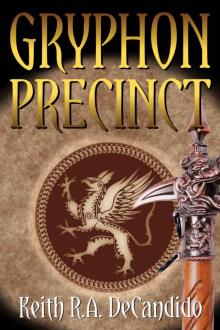 Gryphon Precinct (Dragon Precinct)
Gryphon Precinct (Dragon Precinct) THE XANDER YEARS, Vol. 1
THE XANDER YEARS, Vol. 1 Nevermore
Nevermore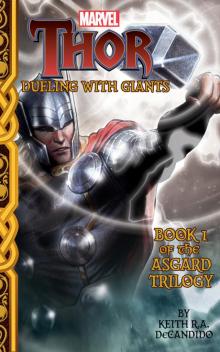 Thor
Thor The Brave And The Bold Book One
The Brave And The Bold Book One I.K.S. Gorkon Book Three
I.K.S. Gorkon Book Three STARGATE SG-1: Kali's Wrath (SG1-28)
STARGATE SG-1: Kali's Wrath (SG1-28) Bone Key
Bone Key Guilt in Innocece
Guilt in Innocece Star Trek - DS9 Relaunch 04 - Gateways - 4 of 7 - Demons Of Air And Darkness
Star Trek - DS9 Relaunch 04 - Gateways - 4 of 7 - Demons Of Air And Darkness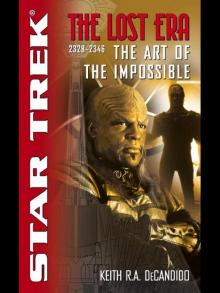 The Art of the Impossible
The Art of the Impossible I.K.S. Gorkon Book One: A Good Day to Die
I.K.S. Gorkon Book One: A Good Day to Die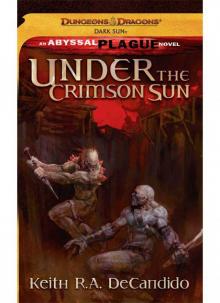 Under the Crimson Sun (the abyssal plague)
Under the Crimson Sun (the abyssal plague) DIPLOMATIC IMPLAUSIBILITY
DIPLOMATIC IMPLAUSIBILITY Tales from the Captain's Table
Tales from the Captain's Table A Burning House
A Burning House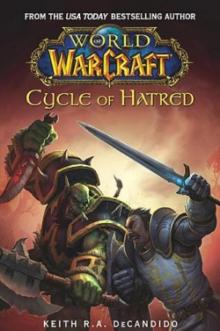 Cycle of Hatred (world of warcraft)
Cycle of Hatred (world of warcraft) Have Tech, Will Travel
Have Tech, Will Travel Security
Security